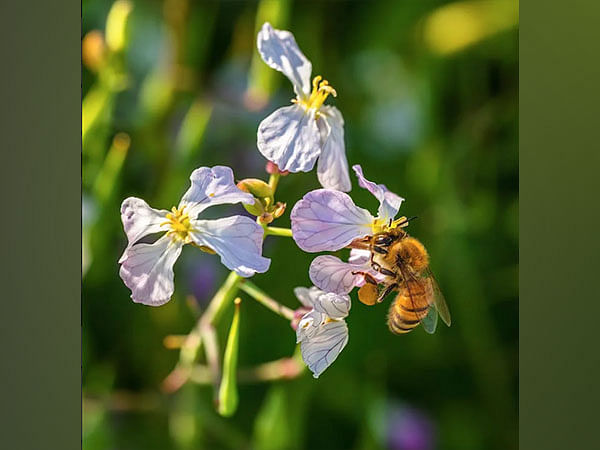Washington [US], July 8 (ANI): According to new research, using an omega-3 rich oil known as “ahiflower oil” helps protect honey bee mitochondria from neonicotinoid pesticide damage. Hichem Menail, a PhD student at the Universite de Moncton in New Brunswick, Canada, carried out this research as part of a larger project.
“Pesticides are a major threat to insect populations, and because insects are at the heart of ecosystem richness and balance, any loss in insect biodiversity can have catastrophic consequences,” Mr Menail said, adding that pesticide-related pollinator declines are also a major concern for food crops globally.
Imidacloprid, a neonicotinoid pesticide, is one of the most widely used pesticides in the world. The EU prohibited imidacloprid for outdoor use in 2018, along with two other main neonicotinoids, although it is still used across the world, including the United States of America.
“Neonicotinoids are among the most toxic and the most harmful insecticides. They are used extensively and are very persistent in the environment. Thus, it is practically impossible to prevent honey bees from being exposed and eventually poisoned,” says Mr Menail. “A more convenient strategy is to boost the immune system and the metabolism of honey bees to allow them to overcome this chemical intoxication.”
To investigate the effects of an omega-3 rich oil on long-term exposure to a neonicotinoid pesticide, three groups of bees were fed sucrose syrup that contained either the pesticide alone, the ahiflower oil alone, or both combined. After 25 days of feeding on these diets, Mr Menail and his team measured the bees’ mitochondrial respiration.
“First, our results confirmed our hypothesis about the hampering effect of imidacloprid on mitochondrial respiration,” says Mr Menail. “What was exciting and somehow surprising is the immediate beneficial effect ofahiflower oil on mitochondrial respiration. Honey bees fed with imidacloprid and ahiflower oil simultaneously had some of their respiration rates recover to the same level than the controls.”
The applications for these findings include possible food supplements that could ultimately help to decrease honey bee mortalities caused by pesticides. “We believe that this strategy is promising,” said Mr Menail. “By improving their respiration through ahiflower oil supplementation, we believethat mitochondria can increase their ATP production and thus improve overall performance of honey bees, as well as their immune system.” (ANI)
This report is auto-generated from ANI news service. ThePrint holds no responsibility for its content.



